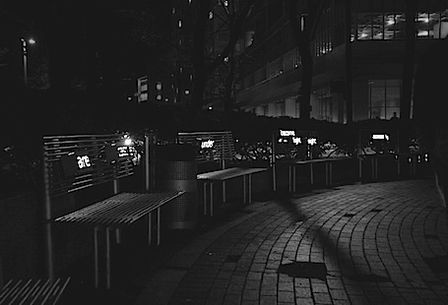
W. Victoria Lee has won a distinction at a prestigious global lighting design awards for an installation which encourages people to interact with light.
A Gates Cambridge Scholar has been awarded a distinction prize at a prestigious international lighting design competition for her installation project which is designed to get people interacting with their cities.
W. Victoria Lee was given the award at the 2013 Fondation Concept Lumière Urbaine (CLU) International Lighting Design Competition. Hers was among 119 projects from over 40 countries that were submitted for the competition this year.
The theme for this year’s competition was “Socialight” and competitors had to reflect on the role of lighting in the urban areas of tomorrow and how it could meet different citizens’ needs.
Victoria [2010] designed, prototyped and installed her project near her previous university, MIT, before starting her PhD at Cambridge in Architecture. She hopes to develop it further and re-stage the installation in other locations in the future.
The installation came about through a graduate design workshop at MIT that encouraged students to explore how lighting technology may be combined with urban design to enhance public spaces. For the final project for the design workshop, the students were asked to do a public space installation anywhere on or around campus. Victoria’s installation, Night Poetry, was inspired by magnetic poetry on fridges. Night Poetry is a set of LED-lit word boxes that friction-fit into the slats of the back of benches at Point Park, a triangular piece of land at the convergence of two busy streets at Kendall Square, Cambridge, Massachusetts.
The tiny park is a popular meeting ground for workers and students. Its proximity to the subway station, dormitories, hotels and the Kendall residential community mean it is also busy in the evening, but the lack of lighting means many are put off passing through it after it gets dark. Instead of flooding the park with typical streetlight, “Night Poetry” gently illuminates the space and injects an element of interactivity by inviting pedestrians to compose short poems that can then be “edited” by other passerby via (re)arranging the word boxes.
Victoria says: “I thoroughly enjoyed conceiving of and producing the project, but the most rewarding thing for me was to have the project installed and to have pedestrians (and not just students) interact with the light boxes and with each other. Our current urban reality is that we are constantly swathed in the incessant streams of digital information delivered to us via our various gadgets, commanding our constant attention even when we are on the go. But just as technology can connect us with one another, it can equally disconnect us from one another and from our environment. While one of the project’s aims was to provide unobtrusive illumination for an otherwise dark space, the more important objective was to improve the passerby’s urban experience by briefly coaxing them out of their digital shell via the juxtaposition of the relatively low-tech lit word boxes with the high-tech communication tools in their hands, pockets and ears.
“While my PhD research focuses on building science and the technical side of architectural studies, I really appreciated the opportunity this serendipitous competition provided to reconnect me with a design-oriented endeavour.”
Victoria’s current research is about improving the way we evaluate indoor overheating risks, which she said is an escalating problem not only for occupant comfort and energy consumption, but also for health given the increasing occurrence of record high temperatures, hot spells and heatwaves in recent years. She has recently written about the global occurrence and human casualty of extreme temperature events and the challenges and limitations we face to study this particular kind of disaster in Natural Hazards.












